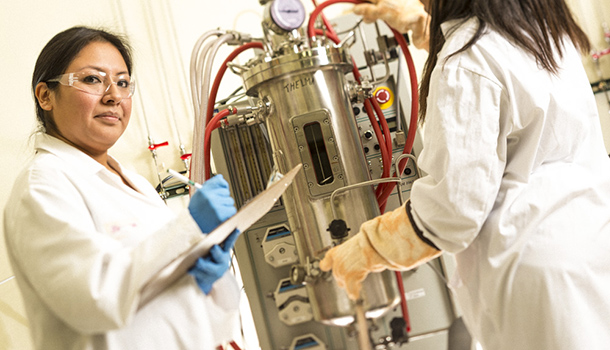
(Photo Credit: Solano/MiraCosta Colleges)
For years Solano and MiraCosta Community Colleges have collaborated in offering biotechnology and biomanufacturing education to equip students to fill technician roles at nearby companies. This fall the two schools will launch identical four-year degree programs in biomanufacturing to meet the industry's growing demand for a highly skilled workforce with increasing levels of education.
“This is the logical next step for us,” said Jim DeKloe, a biology professor and the project lead at Solano Community College. He and his colleague Dr. Ed Re developed and run the Solano College Industrial Biotechnology program.
These new education pathways are possible because of SB850, a 2014 bill authorizing 15 community colleges to offer four-year degrees in a single subject. The bill's intent was to provide alternate ways for an additional one million more Californians to earn bachelor’s degrees each year, a benchmark required for the state to remain economically competitive in the coming decades.
Because the bill stipulates that new degrees cannot duplicate the current offerings from California’s four-year college system, biomanufacturing was a good fit. The closest degree available at a four-year school is biotechnology, a related but very different course of study.
“Any work that our colleges can do to support the needs of the regional employers, it’s a positive thing,” Eloy Ortiz Oakley, who recently became chancellor of the California Community Colleges, said at the time the law was passed. “I applaud the government for allowing this kind of experimentation.”
A rigorous application and review process granted permission to both MiraCosta and Solano Colleges to run pilot programs for the four-year biomanufacturing degree. The nearby companies participateing included Genentech, ALZA Pharmaceuticals, Chiron and IDEC.
DeKloe expects about 30 students, mostly from the current certificate and associate’s programs, to enroll in his school’s inaugural bachelor’s cohort this fall and graduate in 2019. The curriculum, which is shared by MiraCosta College, is designed to promote career advancement.
“Our training programs are specifically designed to get you a job,” said DeKloe. About 90 percent of current graduates find work in biomanufacturing. When former students reach out to DeKloe with the good news about a job, he reminds them that it’s not just a job, it’s a career.
“Our students are from really modest backgrounds,” said DeKloe. Often in their thirties and forties, his students have often struggled in dead-end jobs with little or no room for growth in sectors such as retail and hospitality.
Securing a certificate or associate’s degree in biomanufacturing has put many of these students “firmly in the middle class,” DeKloe explained. The new Baccalaureate degree program will prepare them to take on more advanced work and, with it, the potential for a higher paycheck.
The Baccalaureate degree has deep roots. It’s a result of dedication to both biomanufacturing and collaboration at Solano and MiraCosta Colleges. In 1994, Genentech announced that Solano County would be the site of the largest multiuse cell culture manufacturing facility in the world. In response, DeKloe and his colleagues at Solano began conversations with local industry about the skillsets required for the incoming workforce. The curriculum was developed and in 1997, Solano started offering a one-year certificate and a two-year associate’s degree in biomanufacturing.
Just few years later, in 2000, IDEC announced plans to build a major cell culture manufacturing facility within miles of the MiraCosta Community College campus. By adopting the Solano’s successful curriculum and hiring industry expert Mike Fino to run the program, MiraCosta was able to quickly ramp up and begin training skilled workers to meet growing biomanufacturing needs.
Much like any other four-year program, the biomanufacturing curriculum combines a wide range of subjects including biology, chemistry, engineering, quality and business as well as general education courses incorporating technical writing, bioethics, project management and leadership. In addition, the program aligns a number of courses with certifications from professional organizations such as Six Sigma that are important to the industry.
Unlike most other programs, however, the cost is a mere $10,500 – about half the average price of a more traditional four-year degree. The lower price increases access for a whole host of students who thought paying for a four-year degree was beyond their means.
Solano students will also have the benefit of a new biotechnology/science building at the Vacaville campus. The building, designed with insights from a biotech industrial advisory committee, will include four laboratory suites. Each has a particular focus: cell culture, bioreactor, chromatography and quality control. In many ways, the building itself replicates the features of a biomanufacturing plant, giving students hands-on experience for their future careers.
DeKloe expects the evolution of the biomanufacturing programs at both schools to continue. “I think this field is going to explode,” he said.

